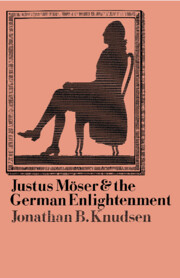Book contents
- Frontmatter
- Contents
- Preface
- Acknowledgments
- Abbreviations
- 1 Justus Möser in the German Enlightenment
- 2 Möser's social universe: urban notability and Enlightenment intelligentsia
- 3 Möser's political universe: secular politics in a confessional state
- 4 Moser's historical universe: regional history and cosmopolitan history
- 5 The party of incremental movement: social and economic reform in Möser's Osnabrück
- 6 Möser's social theory: local patriotism and the defense of the estates
- 7 The dialectic of Enlightenment: the debate over theory and practice
- Bibliography
- Index
6 - Möser's social theory: local patriotism and the defense of the estates
Published online by Cambridge University Press: 17 September 2009
- Frontmatter
- Contents
- Preface
- Acknowledgments
- Abbreviations
- 1 Justus Möser in the German Enlightenment
- 2 Möser's social universe: urban notability and Enlightenment intelligentsia
- 3 Möser's political universe: secular politics in a confessional state
- 4 Moser's historical universe: regional history and cosmopolitan history
- 5 The party of incremental movement: social and economic reform in Möser's Osnabrück
- 6 Möser's social theory: local patriotism and the defense of the estates
- 7 The dialectic of Enlightenment: the debate over theory and practice
- Bibliography
- Index
Summary
In the 1770s Justus Möser acquired national stature as an author, benefiting from an expanding German reading public that became almost insatiable in its consumption of books, newspapers, and journals. The number of writers climbed from an estimated 2,000 in 1770 to 8,000 in 1795, and two-thirds of the roughly 175,000 books published in Germany in the eighteenth century appeared after 1760. The publication of the first three volumes of the Patriotic Phantasies in 1774, 1775, and 1778 – the fourth came out in 1786 – were part of this expansion, and their popularity encouraged a second edition in Möser's lifetime; a third edition was published as part of his collected works shortly after his death. Möser's works were popular because, along with novels and belles lettres, the public especially craved historical-political journalism in these years. About 10 percent of all German book production after 1760 fell into the category of history; about 15 percent of all journals specialized in historical subjects. Except for literature, no other category seems to have grown so rapidly. In addition, local reading societies subscribed to a surprisingly large number of historical-political and cameralist journals. The public clearly demanded this type of writing as part of the awakened interest in reform of all kinds; it read such works in order to examine the legitimacy of the existing order and to begin to create a new civil society with its own historical traditions. Consequently, the greatest interest was in history with a contemporary focus: more than 80 percent of the historical journals dealt with contemporary matters. Moreover, like the Patriotic Phantasies or the Osnabrück History, most of this writing treated provincial affairs.
- Type
- Chapter
- Information
- Justus Möser and the German Enlightenment , pp. 145 - 163Publisher: Cambridge University PressPrint publication year: 1986



